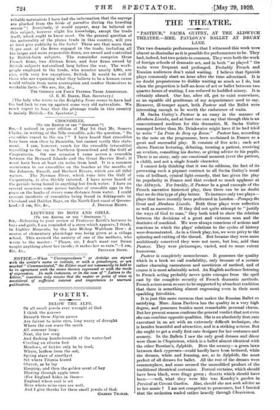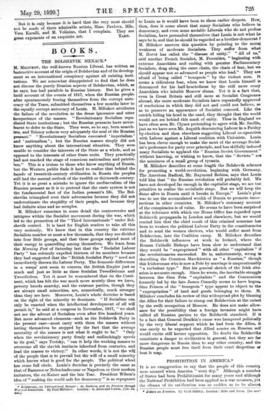THE THEATRE.
"PASTEUR," SACHA GUITRY, AT THE ALDWYCH THEATRE.—MME. PAVLOVA'S BALLET AT DRURY LANE.
THE two dramatic performances that I witnessed this week were almost as dissimilar as it is possible for performances to be. They had, indeed, but two points in common. They were both the work of foreign schools of dramatic art, and in both " as played " the waits were frequent and prolonged. Probably French and Russian audiences don't mind waiting. I believe that Spanish plays commonly start an hour after the time advertised. It is no doubt preposterous to dislike waiting as much as I do, but when the proportion is half-an-hour of act or ballet between two quarter-hours of waiting, I am reduced to huddled misery. It is certainly absurd. One 'has, after all, got to exist somewhere, as an equable old gentleman of my acquaintance used to say. However, ill-temper apart, both Pasteur and the Ballet were interesting enough to be worth the endurance of waits.
M. Sachs. Guitry's Pasteur is an essay in the manner of Abraham Lincoln, and at least one can say that though this is an unaccustomed medium for this dramatist, M. Sachs, Guitry managed better than Mr. Drinkwater might have if he had tried to write " La Prise fix Berg op Zoom." Pasteur has, according to the note on the programme, been acclaimed in France as a great and successful play. It consists of five acts ; each act shows Pasteur lecturing, debating, treating a patient, receiving an ovation, consulting his doctor, or giving advice to his pupils. There is no story, only one emotional moment (over the patient, a child), and not a single female character.
I cannot help thinking that it was its oddness, the fact of its
presenting such a piquant contrast to all Sachs Guitry's usual vein of brilliant, cynical light-comedy, that has given the play its popularity in France and that evoked so much applause at the Aldwych. For frankly, if Pasteur be a good example of the French narrative historical play, then there can be no doubt that we do this type of play better. To instance only two plays— plays that have recently been performed in London—Pompey the Great and Abraham Lincoln. Both these plays were reflective as well as narrative. If they did not quite attempt to " justify the ways of God to man," they both tried to show the relation between the decisions of a great and virtuous man and the destinies of mankind. We were always conscious of actions and reactions in which the plays' relations to the cycles of history were demonstrated. As in a Greek play, too, we were privy to the spinning and cutting of the thread. But because they were more ambitiously conceived they were not more, but less, arid than Pasteur. They were picturesque, varied, and to some extent humorous.
Pasteur is completely monochrome. It possesses the quality
which in a book we call readability, only because of a certain rather charming earnestness and asceticism of method, and of course it is most admirably acted. An English audience listening to French acting probably never quite emerges from the spell cast by the complete security of French dramatic 'methods. French actors seem so sure to be supported by abundant tradition that there is something almost engrossing even in their most sparkling frivolities.
It is just this same sureness that makes the Russian Ballet so
satisfying. Mme. Anna Pavlova has the quality in a very high degree, and possesses besides most remarkable personal charm. But her present season confirms the general verdict that not even she can combine opposite qualities. She is an absolutely first-rate executant in an art with an extremely difficult technique, she is besides beautiful and attractive, and is a striking actress. But she ought to get a really first-rate designer for her costumes and scenery. In the Ballets I saw the only good dresses and decor were those in Chopiniana, which is a ballet almost identical with the other Russian's, Sylphide. Here the scenery—a green lawn between dark cypresses—could hardly have been bettered, while the dresses, white and foaming, are, as in Sylphid,e, the most perfect of all dresses for ballet. All the rest of the dresses were commonplace, and some seemed the unmodified product of the traditional theatrical costumier. Formal curtains, which should have been black, were dingy green ; deserts which should have been—well, what they were like was Kundry's garden in Parsival at Covent Garden. Also, should she not seek advice as to her music ? I am not competent to pronounce, but I fancied that the orchestra waded rather heavily through Choviniana. But it is only because it is hard that the very most should not be made of three admirable artists, Mme. Pavlova, Mlle. Vera Karaili, and X Volinine, that I complain. They are
great exponents of an exquisite art. Tess.







































 Previous page
Previous page